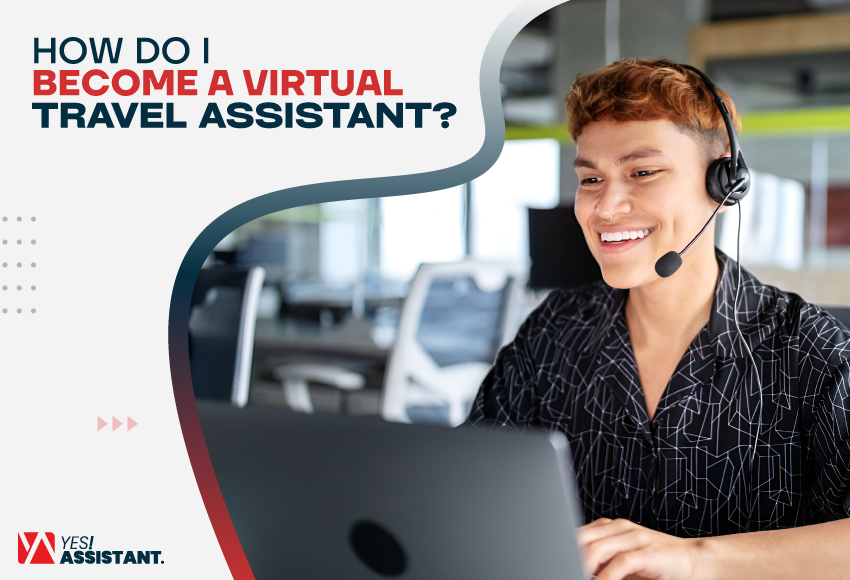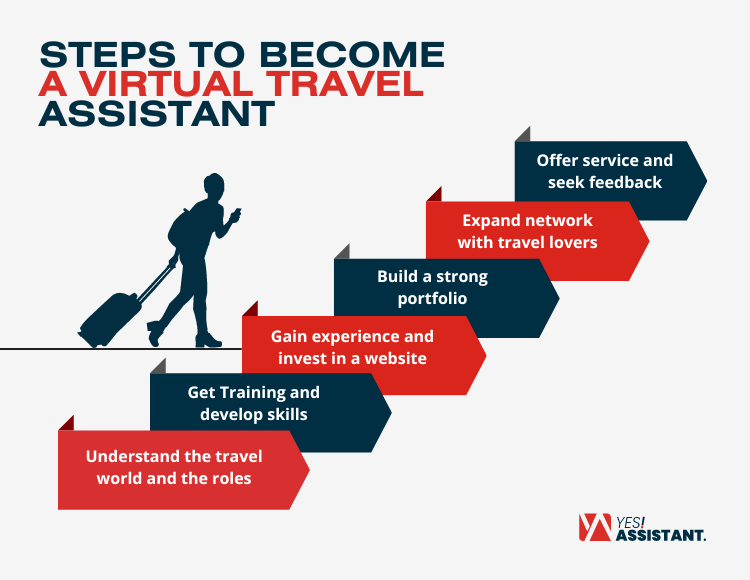
How Do I Become a Virtual Travel Assistant?
Traveling is rewarding but stressful, especially for busy professionals or frequent travelers. A virtual travel assistant helps manage these challenges. So, there is an opportunity to become a virtual travel assistant.
First of all, who is a virtual travel assistant?
A virtual travel assistant is a remote professional who can handle various travel-related tasks. They can book flights and hotels, create itineraries, manage expenses, and provide recommendations. People can save time, money, and hassle and enjoy a more personalized and seamless travel experience by hiring a virtual travel assistant.
According to a report by Grand View Research, the global virtual assistant market size was valued at USD 3.7 billion in 2020 and is expected to grow at a compound annual growth rate (CAGR) of 28.5% from 2021 to 2028. The travel industry is one of the significant sectors adopting virtual assistant technology to enhance customer satisfaction and loyalty.
So, there is demand, and the market size is growing; undoubtedly, becoming a virtual assistant will be wise for you. Now, the next question is how you can be a virtual travel assistant.
Here, we help you explore this profession’s ins and outs. You can know what a virtual travel assistant is, what they do, how to become one, how much they charge, and how they differ from a travel agent. Besides, you can find the benefits and challenges of becoming a virtual assistant for travel and the prospects of this emerging career.
If you are determined to become a virtual travel assistant, don’t be late and lazy.
What's Inside
- What Is a Virtual Travel Assistant?
- What Does a Travel Assistant Do?
- How to Become a Virtual Assistant for Travel?
- Step 1: Understand the Travel World and the Role of a Virtual Travel Assistant
- Step 2: Get Training and Develop Necessary Skills
- Step 3: Gain Experience, Invest in the Website, and Build an Online Presence
- Step 4: Build a Portfolio
- Step 5: Expand the Network with Travel Lovers & Agencies
- Step 6: Offer Your Services and Seek Feedback
- How Much Can You Get as a Virtual Travel Assistant?
- Is Becoming a Virtual Assistant for Travel Effective?
- What Is the Difference Between a Travel Agent and a Travel Assistant?
- Is There an AI Travel Agent?
- Conclusion
What Is a Virtual Travel Assistant?
A virtual travel assistant is a person who provides travel-related services to clients remotely or from home. They use online tools and platforms. A virtual travel assistant assists in planning and managing travel, including finding the best deals, booking flights and hotels, creating itineraries, managing expenses, handling reservations, and providing recommendations.
Moreover, a virtual travel assistant can work as an independent freelancer or as part of a virtual assistant company or a travel agency. A virtual travel assistant can cater to different types of travelers, such as solo travelers, business travelers, families, or groups.
What Does a Travel Assistant Do?
A virtual travel assistant can perform various tasks to make the travel experience easier and more enjoyable. Some of the common tasks that a travel assistant can do are:
Planning Itineraries
A virtual travel assistant can help people plan their trip by creating a customized itinerary based on their preferences, budget, and goals. They can research the best destinations, attractions, activities, and events for travelers. They also arrange them in a logical and convenient order. So, they can also provide helpful information and tips about the places people are visiting, such as the weather, culture, safety, and transportation options.
Manage Travel Expenses
A virtual travel assistant can also help travelers manage their travel expenses by tracking and recording their spending and creating and updating their budgets. They also provide reports and insights. They can also help save money by finding and applying discounts, coupons, and loyalty programs and negotiating with vendors and service providers.
Manage Impromptu Plans
Virtual travel assistants are flexible and adaptable to people’s changing needs and preferences. For this reason, they can easily manage their impromptu plans. They can handle unexpected situations or emergencies during the trip, such as flight delays, cancellations, rescheduling, lost or stolen luggage, medical issues, or legal problems. They can also help people make last-minute changes or additions to their itinerary, such as booking a new hotel, finding a local guide, or joining a tour.
Get the Best Deals
A virtual travel assistant can help travelers get the best deals by comparing and analyzing various options and offers for their travel needs. They can use their expertise and network to find the best prices, quality, and availability for people’s desired services and products. They can also help avoid hidden fees, surcharges, and scams affecting travel budget and experience.
Recommendations
People can take recommendations from virtual travel assistants. They provide honest and unbiased feedback and suggestions for the trip. Besides, they can recommend the best places to visit, eat, shop, and have fun based on their interests, tastes, and expectations. They can also share their personal experiences and insights about the destinations and activities they are interested in and answer any questions or doubts they may have.
Manage the Visa Process
Virtual travel assistants also manage the visa process. They can assist travelers with the application and documentation requirements for the countries that they are visiting. Besides, they can advise the best time and method to apply for their visa. They also help to fill out and submit the necessary forms and papers.
Travel Bookings
Travel booking is one of the vital responsibilities of a virtual travel assistant. They can easily handle the reservation and confirmation of flights, hotels, car rentals, tours, and activities. They can ensure that traveler’s bookings are accurate, complete, and secure and that they receive the confirmation and confirmation numbers for their reservations. Virtual assistants can also help you with the check-in and check-out processes. They also provide the details and instructions for their travel arrangements.
Handling Reservations
A virtual travel assistant can handle reservations by managing and updating bookings and reservations for people’s trips. They can help travelers make changes, cancellations, or extensions to their reservations and communicate with the service providers and vendors. Also, they can help with any issues or disputes with traveler’s reservations, such as overbooking, double booking, or refunds.
As you can see, a travel assistant can do many things to make people’s travel more accessible and more enjoyable. But how do you become a virtual assistant for travel? Let’s find out in the next section. So, in traveling, the virtual assistant is worth the travelers.
How to Become a Virtual Assistant for Travel?
If you love traveling and helping others, becoming a virtual assistant for travel might be your perfect career choice. But how do you get started in this exciting and rewarding field? Here are proven seven steps that you can follow to become a successful virtual travel assistant:

Step 1: Understand the Travel World and the Role of a Virtual Travel Assistant
The first step to becoming a virtual travel assistant is understanding the travel world and the role of a virtual travel assistant. You need to have a passion for travel and a curiosity for different cultures and places. It’s also essential for you to understand the duties, services, and types of clients performed by virtual travel assistants.
Here, you can do some research online, read blogs and articles, watch videos, and listen to podcasts about travel and virtual assistance. You can also ask other virtual travel assistants about their experiences, challenges, and tips.
Step 2: Get Training and Develop Necessary Skills
The second step toward becoming a virtual travel assistant is acquiring the requisite knowledge and abilities through training. To carry out your duties correctly and efficiently, you must possess a few fundamental abilities and information, such as:
- Communication skills: You must communicate clearly and professionally with your clients and service providers using various channels and tools, such as email, phone, chat, video call, etc. You also need to be able to listen actively, ask relevant questions, and provide feedback and suggestions.
- Organizational skills: You must use tools like task managers, spreadsheets, and calendars to organize, prioritize, and manage your assignments and projects. In addition, you must be able to manage several clients, adhere to deadlines, and monitor your development and outcomes.
- Research skills: Utilizing resources like databases, websites, search engines, and other technologies, you must be able to locate and evaluate information and data. You must possess the ability to assess the caliber, dependability, and pertinence of the resources and data you employ.
- Problem-solving skills: You need to identify and resolve issues and challenges that may arise during your work. You also have to know the use of logic, creativity, and critical thinking tools. Additionally, you must be able to identify different answers and adjust to changing demands and circumstances.
- Technical skills: You must be knowledgeable about the platforms and technologies you use to carry out your duties, including reservation platforms, travel websites, travel apps, and so forth. Additionally, you must be proficient in using word processors, spreadsheets, presentation tools, and other standard software and apps.
You can acquire and improve these skills by taking online courses, reading books and guides, watching tutorials, and practicing independently or with friends and family. You can also join online communities and forums to learn from other virtual travel assistants and experts, ask questions, and get feedback.
Step 3: Gain Experience, Invest in the Website, and Build an Online Presence
The next step is crucial. You need to gain experience; for this, you should invest in a website and build an online presence. It’s crucial to have experience, work samples, and an internet presence to draw in customers, highlight your abilities and services, and advertise your company.
You can do the following to achieve these goals:
- Gain experience: You can start by offering travel services to friends, family, or acquaintances. Looking for volunteer or internship opportunities with travel agencies, bloggers, or influencers is an excellent opportunity. You can also join online platforms for virtual travel assistant jobs and projects.
- Invest in a website: Then you should create a website featuring your portfolio, testimonials, services, rates, and contact details using WordPress, Wix, and Squarespace.
- Build an online presence: Social media platforms like Facebook, Instagram, Twitter, and LinkedIn allow you to share your work, share content, and engage with followers and potential clients. Participate in online groups and networks to connect with other virtual travel assistants and travel enthusiasts.
Step 4: Build a Portfolio
Then, you need to build a strong portfolio to become a virtual travel assistant. A portfolio is a collection of your work samples and achievements. This will demonstrate your skills, experience, and the quality of your services. A portfolio can help you showcase your work to potential clients and convince them to hire you.
Here are some elements you can include in your portfolio:
- Your resume or CV
- Your testimonials or reviews
- Your case studies or success stories
- Your work samples or examples
You can display your portfolio on your website or create a separate online portfolio. Most importantly, you must regularly update and improve your portfolio as you gain more experience and work.
Step 5: Expand the Network with Travel Lovers & Agencies
From the very beginning, you can build a traveling network with travel lovers and agencies. But after getting a bit of experience, it will become mandatory for this profession. The more you expand your network, the more you can serve your clients. In short, Networking is a crucial strategy for growing your business and career.
You can also learn from and collaborate with other professionals and experts in your field and get support and advice. Here are some tips to expand your traveling network:
- Attend and join events and meetups
- Create and join groups and communities
- Reach out and connect with influencers and leaders
A good network never disappoints you. So, focus on this with the highest priority.
Step 6: Offer Your Services and Seek Feedback
The sixth and final step to becoming a virtual travel assistant is to offer your services and seek feedback. You need to market and sell your services to potential clients and convince them to hire you. Besides, you need to seek feedback from your clients and use it to improve your services and skills.
You can create and send proposals or pitches to your prospects. In your proposal, you can explain what you can do for them, how to help them, and why they should choose you. You can also include your portfolio, testimonials, rates, and contact details, making your proposal clear, concise, and compelling.
Besides, you can ask your clients for feedback during or after your work and collect their opinions, suggestions, and ratings to improve your next service. You can also thank your clients for their feedback and use it to improve your services and skills. Along with this, you should address any issues or complaints. You can also ask your clients for referrals, testimonials, or reviews and use them to attract and convince more clients.
You can follow These six steps to become a virtual assistant for travel. By following these steps, you can start and grow your own virtual travel assistant business and enjoy a fulfilling and exciting career.
How Much Can You Get as a Virtual Travel Assistant?
The payment you can get as a virtual travel assistant can vary depending on several factors, such as:
- The type and complexity of the tasks
- The level of experience and expertise that you have
- The location and availability of the traveler
- The duration and frequency of your collaboration
- The quality and reliability of your services
Virtual travel assistant often charges $15 to $50 per hour. However, some virtual travel assistants may charge a flat fee, a commission, or a package deal, depending on the nature and scope of the project. Therefore, discussing and agreeing on the payment terms and methods with your client before you start working with them is essential.
Is Becoming a Virtual Assistant for Travel Effective?
Becoming a virtual assistant for travel can be an effective and rewarding career choice for many people if you love traveling and helping others. It can allow you to work from anywhere, set your schedule, and choose your clients and projects. You can also earn a good income as well.
It can also allow you to learn new skills, explore new places, and meet new people. However, becoming a virtual assistant for travel also requires hard work, dedication, and professionalism. So, you need to be able to deliver high-quality services, meet deadlines and expectations, and handle challenges and issues.
You also need to be able to market yourself and your business and find and retain clients. You should always be confident with your clients. Therefore, becoming a virtual assistant for travel can be effective, but only if you are willing and able to do what it takes.
What Is the Difference Between a Travel Agent and a Travel Assistant?
A travel agent and a travel assistant are both professionals who help clients with their travel needs. But they have different roles and responsibilities. Here are some of the main differences between them.
A travel agent is someone who sells and arranges travel products and services, such as flights, hotels, tours, and insurance, for their clients. They usually work for a travel agency or company, earning commissions or fees from their sales. A travel agent’s primary goal is to find the best deals and options for their clients and to make bookings and reservations on their behalf.
A virtual travel assistant provides travel-related support and assistance to clients, such as creating itineraries, managing expenses, handling reservations, and providing recommendations. They usually work as independent freelancers or as part of a virtual assistant company and charge hourly rates or flat fees for their services. A virtual travel assistant’s primary goal is to make their clients’ travel experience easier and more enjoyable and to handle any issues or challenges that may arise during their trip.
Is There an AI Travel Agent?
An AI travel agent is a software program that uses artificial intelligence to help travelers with their travel needs, such as finding and booking flights, hotels, tours, and activities and creating and managing itineraries. It also provides recommendations and tips for handling issues and emergencies.
An AI travel agent can communicate with travelers through various channels and tools, such as chatbots, voice assistants, websites, apps, etc. An AI travel agent can also use data and machine learning to analyze and predict travel trends, preferences, and behaviors and to offer personalized and optimized services and solutions. There are many examples of AI travel agents in the market, such as PlanTripAI.com, BetterTravel, Roam Around, etc.
Conclusion
Virtual travel assistant service is not a relaxing job. Connect well with various partners to grow in this field. Otherwise, you can’t make good money from this. Besides, this job is fascinating; you can help people and increase your goodwill. In this career, you must confirm and retain clients to scale up your business.
Here, we have learned what a virtual travel assistant is, what they do, how to become one, how much they charge, and how they differ from a travel agent. We hope this article has been helpful and informative for you, whether you are looking for a virtual travel assistant to help you with your next trip or are interested in becoming one yourself.




